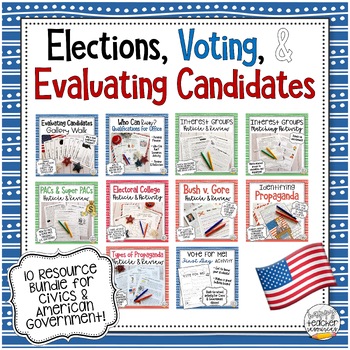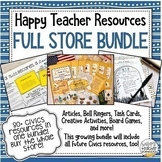Elections, Voting, and Evaluating Candidates Bundle | 10 resources for Civics!
- Zip
- Easel Activity
What educators are saying
Products in this Bundle (10)
showing 1-5 of 10 products
Also included in
- This Full Store Civics Bundle includes everything Civics-related in the Happy Teacher Resources TPT store. With over 80 products so far, this bundle offers a wide-range of resources covering so much of your Civics curriculum: everything from articles to board games, station activities to escape roomPrice $250.00Original Price $372.75Save $122.75
Description
This Elections, Voting, and Evaluating Candidates Bundle includes resources on United States elections, the Electoral College, propaganda, interest groups, PACs and Super PACs! Perfect for middle and high school Civics, American History, and American Government students, this bundle includes reading passages, a gallery walk, matching activities, and other unique activities. I've also included my "Vote For Me" student survey, a fun worksheet to use to get to know your students -- you can even use them as campaign posters if you have a classroom election!
This Bundle includes:
✯ Who Can Run? Evaluating Candidates Article | Elections & Voting for Civics
- Aligned to Florida State Standard SS.7.CG.2.7: Identify the constitutional qualifications required to hold state and national office.
- Students read the Who Can Run? Article on the requirements to run for the Presidency, Senate, and House of Representatives. Students also analyze a quote from Article I of the Constitution to determine the candidacy requirements for the House of Representatives.
- In the Article Review worksheet, students take notes, summarize the main idea in their own words, and answer two scenarios to determine whether someone is eligible to run for office.
- The Scenarios worksheet has students read through more fictional scenarios of people wanting to run for political office, and they use what they have learned to determine whether the characters meet the requirements to run for office.
- A final Definitions and Response worksheet has students define key terms (such as candidate, election, and campaign) and answer a reflection question.
✯ Evaluating Candidates Gallery Walk | Elections Activity for Civics!
- Students read an article on the various criteria with which voters evaluate potential presidential candidates, including military service, work experience, education, and prior government experience.
- The article comes with a review, in which students demonstrate comprehension of the reading passage and decide which criteria is most important to them personally.
- Students then participate in a gallery walk, in which they read the anonymous biographies of various "candidates" and vote on who they think is most qualified to earn their vote.
- A reflection after the gallery walk has students think about what they have learned and whether they have changed their minds about the criteria they originally said was so important to them.
- Includes the PDF of the worksheets and gallery walk and a Powerpoint Presentation with the candidate "reveals".
✯ What Is an Interest Group? Article & Review | Voting & Elections for Civics
- Aligned to the Florida State Standard for Middle School Civics, SS.7.CG.2.8: Examine the impact of media, individuals, and interest groups on monitoring and influencing government.
- A 2-page What is an Interest Group? Article introduces students to the concept of interest groups, detailing the purpose of interest groups in influencing government, raising awareness about their issue, and funding political candidates' campaigns, defines lobbying, and includes examples of the main kinds of interest groups, from economic, equal opportunity, and public interest.
- The What Is an Interest Group? Review has students demonstrate comprehension of the article by answering questions, completing creative prompts, and even creating their own interest group and suggesting a piece of fictional legislation their group might lobby Congress to support.
- Finally, the Gaining Interest Group Support worksheet asks students to read about a fictional candidate's policy goals and identify which interest groups, listed in the article, might donate to the candidate's campaign. A great, challenging way to finish the lesson, which requires students to think critically and make connections!
✯ Interest Groups Matching Activity | Voting and Elections for Civics & Government
- Aligned to the Florida State Standard for Middle School Civics, SS.7.CG.2.8: Examine the impact of media, individuals, and interest groups on monitoring and influencing government.
- This Interest Groups Matching Activity challenges students to match various Interest Groups (such as the Humane Society or Everytown for Gun Safety) with the candidate they would most likely support and the piece of legislation they would most likely lobby Congress for.
- Can be leveled for student ability. The first page is a cut-and-paste activity, providing the matches for the students. The second page, which can be given to students looking for a higher challenge, requires them to fill in the blanks themselves!
✯ PACs and Super PACs Article & Review | Voting and Elections for Civics
- Aligned to the Florida State Standard for Middle School Civics, SS.7.CG.2.8: Examine the impact of media, individuals, and interest groups on monitoring and influencing government.
- A What Are PACs and Super PACs? Reading Passage defines political action committees, Citizens United, and how these groups influence our political elections.
- An Article Review asks students to define key terms and summarize the article's key concepts, as well as to read various actions by interest groups and determine if they were the work of PACs or Super PACs.
- An optional Online Activity has students view three different campaign videos on http://www.livingroomcandidate.org/ and determine whether they were funded by a candidate's campaign or a Super PAC.
✯ Electoral College Article & Map Activity | Civics & American Government
- Aligned to the Florida State Standard for Middle School Civics, SS.7.CG.3.14: Explain the purpose and function of the Electoral College in electing the President of the United States.
- A How Do We Choose the Next President? Electoral College Article explains the difference between the popular vote and the electoral college and details how a president must win 270 electors in order to win the presidency.
- In the Electoral College Review, students are quizzed on key vocabulary and concepts from the article, checking their comprehension and understanding of the Electoral College, as well as asking students to reflect on whether the Electoral College is a fairer and more effective system than a simple popular vote.
- The Mapping the Electoral College Chart & Map Activity lists the various Red, Blue, and Swing States with their respective Electoral College votes, and students are asked a number of comprehension questions, some involving simple math and chart-reading skills. Can be done individually or with a partner!
✯ Bush v. Gore Article & Review | Landmark Supreme Court Cases for Civics
- Pairs great with the Electoral College Article & Map Activity
- In the Bush v. Gore Article, students are introduced to the 2000 election and the controversial Supreme Court case that determined its outcome.
- The Bush v. Gore Article Review includes 9 questions to test comprehension of the reading passage, including defining of key terms and summarizing the impact of Bush v. Gore.
✯ Types of Propaganda Techniques Article & Review | Civics & American Government
- Aligned to the Florida State Standard SS.7.CG.2.9: Analyze media and political communications and identify examples of bias, symbolism and propaganda.
- The Types of Propaganda Article introduces the concept of propaganda and describes, with examples, each of the major seven types: Bandwagon, Card Stacking, Glittering Generalities, Name-Calling, Plain Folks, Testimonials, and Transfer.
- In a Types of Propaganda Note-Taking Chart, students identify each of the propaganda techniques and create an example.
- The Types of Propaganda Review has students define key terms and describe key concepts from the article, including matching various scenarios to the propaganda techniques being employed.
- Finally, an Optional Internet Activity has students watch 3 historical presidential campaign ads and list all the types of propaganda they spotted.
✯ Identifying Propaganda Techniques | Worksheet for Civics & American Government
- Aligned to the Florida State Standard SS.7.CG.2.9: Analyze media and political communications and identify examples of bias, symbolism and propaganda.
- This is a fun one! In this Identifying Propaganda Techniques Worksheet, students are given a picture of a political candidate giving a campaign speech. In something a bit like a scavenger hunt, they read through the speech and analyze the image, hunting down every example of propaganda they can find.
- Makes for a great group or partner activity. Really a lot of fun!
✯ "Vote For Me" Back to School Activity for Civics and Government
- Bonus activity!
- This Student Survey has students "run for office" by creating a campaign slogan, including a picture of themselves, and describing not only their interests but something about the world they would like to change.
- Can be used in the beginning of the school year or during an Elections Unit, especially if you're holding a class-wide election!
This resource comes as a ZIP file full of non-editable PDFs, with Answer Keys included. Most resources are also available as TPT Easel digital activities, which can be assigned directly to Google Classroom or shared with your students via a link!
If you enjoy this resource, leave a review! Go to “My Purchases” on your TPT account, scroll to the resource, and click the green “Provide Feedback” link. You can rate the product, leave a review, and collect TPT credits that you can use on other products!
Other Happy Teacher Products you might enjoy:
✩ Civics: Citizenship & Civic Obligations Unit Bundle | 11 Resources!
✩ Foundations of American Government: Influential Documents BUNDLE!
✩ Declaration of Independence Activities Bundle | Civics & American Government
✩ Preamble to the Constitution Activity Bundle | for Civics & American History
✩ Articles of Confederation Activity BUNDLE | for Civics & American History



